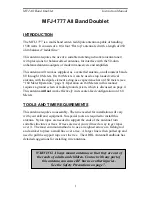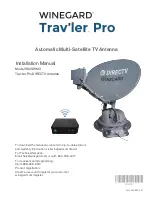
MFJ All Band Doublet Instruction Manual
4
The earth ground should consist of at least one copper ground rod driven into
the earth a minimum of 6 feet. Multiple ground rods and buried wires are
superior to a single rod for lightning and RF protection. 160 meter operation
requires special grounding considerations. These considerations are discussed
in the "160 Meter Operation" section.
Never use woven flexible braiding for ground connections unless
absolutely
necessary
. Braiding has high resistance to RF and lightning. Copper flashing,
wide copper foil, or large gauge solid copper wires are the proper materials for
use in RF and lightning grounding applications. Never ground the feedline on
the antenna side of the balun.
In-line coaxial lightning arrestors offer a minimal improvement in lightning
protection. The best method of protecting station equipment is to disconnect the
feedline outside the building.
TUNER REQUIREMENTS
As noted earlier, this antenna requires an antenna tuner, ideally one that is able
to tune balanced feedlines. If you have a tuner that tunes only unbalanced, 50-
ohm loads (such as the internal tuner in some transceivers) it is still possible to
use this antenna. Connect a suitable 4-to-1 current balun (such as the
MFJ-912
“W9INN Balun Box”) between your balanced feedline and your transceiver
through a short piece of 50-ohm coax.
TUNING THE ANTENNA
This antenna comes with 100 feet of high-quality balanced feedline. In general
any length of feedline will tune on all bands with this antenna. You may add
more feedline if necessary to span the distance from your tuner to the antenna,
or you may shorten the feedline if it is much too long (there is nothing magic
about the 100 feet supplied). Should you find that it is impossible to tune your
antenna on one or more bands, after you have exhausted the recommendations
in your tuner manual, then try changing the length of the feedline, by adding or
subtracting, say, five percent, or three to six feet, of feedline length.
MAINTENANCE
























